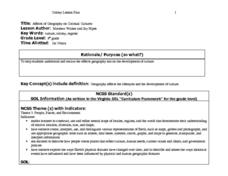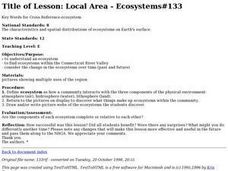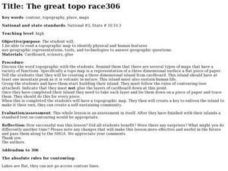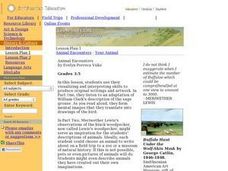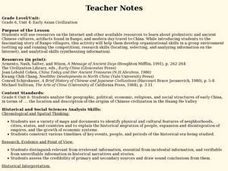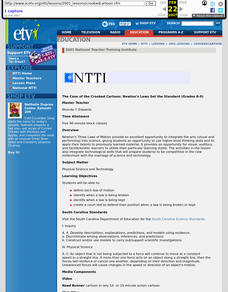Curated OER
Affects of Geography on Colonial Cultures
Sixth graders examine the effects of geography on the development of culture. They discuss how geography can affect the lifestyles and development of a society's culture. Students examine the geography and climate of New England and the...
Curated OER
How We Get From Here to There
Students recognize various types of movement people rely on to get from one place to another, locate the forms of movement on a map and choose one form of movement and research its path.
Curated OER
Aquatic Insects: Water Quality Index & Diversity Index
Students search stream beds to study the life cycle and adaptations of stream insects. They explore creeks and streams to see the diversity index of creeks or streams and to find the water qualit index.
Curated OER
Local Area - Ecosystems
Students examine ecosystems in the Connecticut River Valley. They view and discuss photos of ecosystems within their community, and create a picture web of an ecosystem.
Curated OER
Facts, Feats and Folklore: Spiders
Students review and discuss a variety of sayings, folklore and superstitions about spiders. They discuss this information and choose either an interesting fact or appealing foklore tradition to illustrate.
Curated OER
Breaking News English: World Population Aging At Record Rate
For this English worksheet, students read "World Population Aging At Record Rate," and then respond to 1 essay, 47 fill in the blank, 7 short answer, 20 matching, and 8 true or false questions about the selection.
Curated OER
Can You Make A Penny Float?
Learners explore the concept of density by trying to make a penny and other materials float.
Curated OER
Paper Structures
Young scholars demonstrate that material strength varies with shape and arrangement.
Curated OER
Raleigh Bound!! A Virtual Tour
Fourth graders navigate a DPI web site to answer questions as they preview the Capitol, Legislative Building, and Museum of Natural Sciences before an actual trip to Raleigh.
Curated OER
Metalling in Around the World
Third graders explore the important leaders in different cultures by researching coinage. Through this process, they also recognize the cultural universality on coinage and currency.
Curated OER
The Great Topo Race
Pupils create a three dimensional island out of cardboard to examine how to read and use a topographical map. They make sure that their island can sustain life and that it has one volcanic mountain peak. They trace the parts of their...
Curated OER
Avalanche
Students investigate the concept of avalanches and how they effect people who use the slopes. They conduct research using multiple resources that includes the internet in order to create a final oral presentation.
Curated OER
Why Do You Live Where You Do?
Eighth graders identify reasons why settlers bought land from the railroad and not a Homestead grant. Using that information, they compare and contrast the types of land given in each situation. They discuss the reasons why given...
Curated OER
Letters from the Japanese American Internment
Young scholars make deductions about life in an internment camp by reading and comparing letters written to Clara Breed. Along the way, they consider the advantages of looking at a historical event from the multiple points of view of...
Curated OER
Life in a Cup
Third graders make and maintain a mini terrarium. They keep a daily journal of what happens in their terrarium and record daily observations and measurements.
Curated OER
Making Paper
Students create paper by adding a few small scraps of paper into the blender pitcher and adding just enough water to thoroughly soak paper.
Curated OER
Lewis and Clark: The Language of Discovery
Students replicate some of the trailblazing methods of Lewis and Clark on a fifteen-minute "writing journey" through the school or neighborhood.
Curated OER
Animal Encounters
Students use their visualizing and interpreting skills to produce original writings and artwork.
Curated OER
How Things Fly
Students observe photographs of selected twentieth-century aircraft at the National Air and Space Museum and note differences in the design of aircraft wings, fuselages, and engines.
Curated OER
Stories of the Wrights' Flight
Pupils examine and compare primary and secondary source accounts of the Wright brothers' first flights on December 17, 1903.
Curated OER
Banpo Village: Gone, But Not Forgotten
Sixth graders plan a trip to China and prepare yourself for the Banpo excavation site competition by studying prehistoric and ancient Chinese history.
Curated OER
Dam-it? I Just Don't Know!?!
Eighth graders analyze two different large dams: The Hoover Dam and the Three Gorges Dam. They compare and contrast the two dams.
Curated OER
The Case of the Crooked Cartoon: Newton's Laws Set the Standard
Students have the opportunity to use higher-level thinking skills and to apply their talents to previously learned material. It provides an opportunity for visual, auditory, and tactile/kinetic learners to utilize their particular...
Curated OER
Pictures Telling Stories
Students see the importance of primary sources in the study of history, but also the limitations of relying only on primary sources of taking the money, as it were, at face value.


